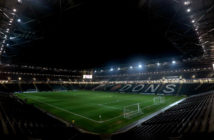At the start of this tournament, the nation couldn’t have been more split on their opinions of Gareth Southgate and his ability to bring this England side together playing entertaining football while winning.
However, Southgate has only bolstered his repertoire of international tournament success, now featuring in his second major tournament and establishing two semi-finals and a final in his time at the helm of the Three Lions.
Wednesday night’s game started in the opposite fashion to that Croatia game three years ago, an absolutely sensational free-kick from one of the young stars of the tournament Mikkel Damsgaard, a dagger into the heart of the Three Lions.
For many, including myself, it felt like the journey was coming to an end. Up to that point England hadn’t conceded a goal in nearly 700 minutes, an amazing feat and it put the side in a scenario we hadn’t seen them in for an awfully long time, a goal behind.
However, what ensued was a Southgate masterclass. As we have become accustomed to throughout the tournament, consistently making decisions that have shocked the nation but in the long run have worked and the inclusion of Bukayo Saka was pivotal to the equaliser.
England’s options on the wings are not limited at all, featuring some of the most skilful and tricky players in the tournament, and the Sancho > Saka or vice versa debate has been there throughout.
Saka proved himself once again, his electrifying pace and rawness has made him a threat when he has played during the tournament, making a very strong case for his position in the starting 11 for the final.
After this though, England’s tempo changed, control seemed to shift and the Danes seemed to be on the back foot for the first time in the game. A welcome change for the nation, less so seemingly for the rest of Europe.
The winner, however, has been spoken about in the days since like no other controversy at the tournament so far. The goal again came from the right-hand side of the English attack this time through Raheem Sterling. Who went down under contact, albeit it very minimally. Questions have since flown around social media as to whether there was enough contact for it to be a penalty but also surrounding the penalty itself.
A laser was shone in the direction of Kasper Schmeichel in the run-up to the penalty which could have seriously impacted his vision.
While at times under Southgate England have seemed inefficient and lacklustre, looking backwards and sideways when on the ball rather than looking forward, in the 118th minute on Wednesday, the backwards and sidewards passes were cheered like goals.
However you see it, last night’s game against the Danes felt poetic for many reasons. Southgate’s redemption coming 25 years after Euro 96, a penalty sealing the win for England, no matter how controversial it may have been.
Furthering this thought, Southgate showed the Danes the empathy he got all those years ago, he knows what it can be like to go out at this stage and I’m sure behind the scenes has given his players the knowledge that whatever happened in that game, he and the rest of the nation would be proud of his side.
Whatever the result on Sunday, I’d put a strong case forward that football has already come home. The nation is together in their support for the team once again and after the last 18 months, the country is once again united in their efforts, rather than to isolate to stop covid. The nation is together in support of its national side. At the end of the day though, is that what bringing football home should be about?
Because if so, Southgate really might be the one, and football has already come home again.
Follow us on Twitter @ProstInt
![Prost International [PINT]](https://prostinternational.com/wp-content/uploads/2021/08/PINTtFontLogoRoboto1536x78.jpg)


